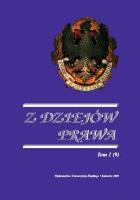Wolność w "Mowach..." Wincentego Skrzetuskiego
Freedom in "Speeches..." by Wincenty Skrzetuski
Author(s): Wojciech OrganiściakSubject(s): Law, Constitution, Jurisprudence
Published by: Wydawnictwo Uniwersytetu Śląskiego
Summary/Abstract: Wincenty Skrzetuski considered the ideas of freedom in the context of the social contract, the aim of which concentrated not only on the protection of one's property, but also life and freedom. Skrzetuski, as one of the first Polish authors considering the contract conception, was in favour of the resignation of the people constituting the society from the part of the inherent freedom. There is no doubt, though, that Skrzetuski, when presenting the role of laws in creating the society and therein maintaining the freedom of man, referred directly to the hints by Jean Jacob Rousseau. Enthusiasm expressed by the Polish Piarist towards the conception in question should be accounted for a well-known native tradition of subordination to the laws established by the political nation. Skrzetuski stressed, among other things, the fact that the established laws enabled for combining the freedom of man with the gravity of the authority whereas the loss of the inherent freedom was actually very useful for the society. Skrzetuski, like Rousseau, claimed that each attempt to limit the freedom of citizens by the authority equaled the breach of contract and resulted in the return to the state of nature. It also needs to be emphasized that Skrzetuski, showing the formation of society, strongly emphasized the role of law as a causative factor and a warranty of maintaining freedom inherent to man. According to Skrzetuski, the law should lead to happiness and perfectness in the case of people who, in turn, should be protected from despotism, given a warranty of justice and freedom, which is a typical example of using the Enlightenment conceptions and combining them with the Antique tradition where many inspirations for the Enlightenment thinkers can be found. Skrzetuski, in his considerations on freedom, also stressed the educational function of law, pointing out the problem of up-bringing and educating the youth, but also, in broader terms, from the perspective of the attitudes of the whole noble nation criticized for abusing freedom and laws. Speaking of the king succession to the throne, proposing the introduction of the hereditary monarchy, he had to face another stereotype consisting in him convicting the "political nation" about a constant danger on the part of the king aiming at the absolutum dominium, and, thus, being dangerous for laws and noble freedom.
Journal: Z Dziejów Prawa
- Issue Year: 9/2008
- Issue No: 1
- Page Range: 67-90
- Page Count: 24
- Language: Polish

